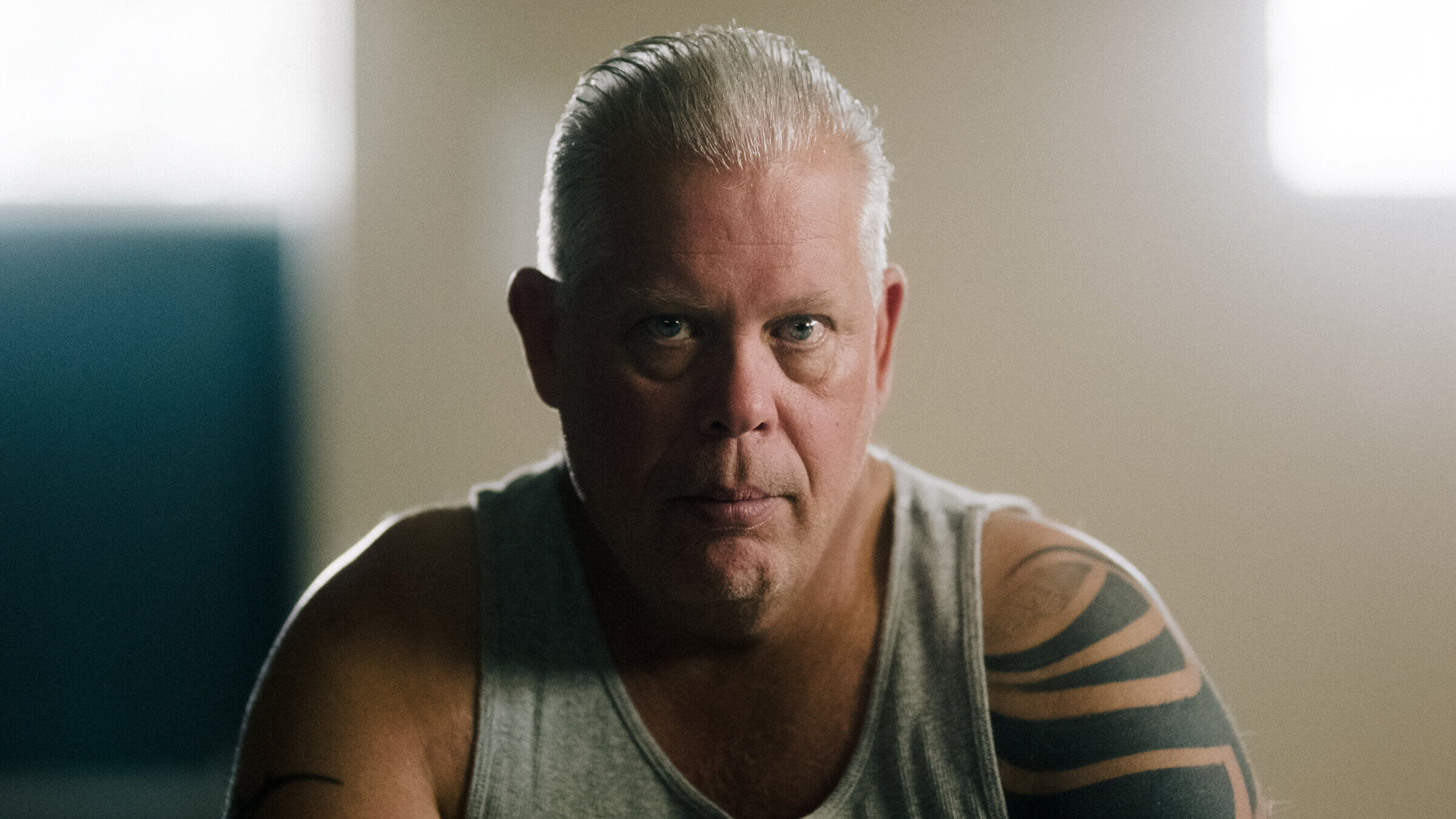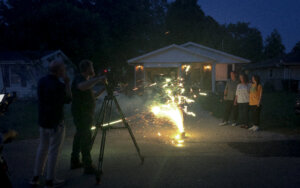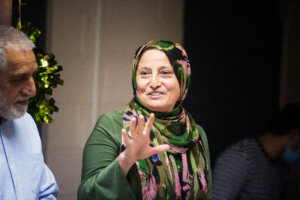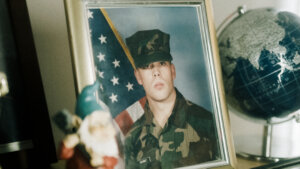Why a Jewish sensibility was crucial to telling the story of a hate-filled extremist’s astounding change of heart
In Joshua Seftel’s documentary “Stranger at the Gate,” a would-be mosque bomber comes to embrace Islam

The surprising trajectory of Richard ‘Mac’ McKinney is the focus of Joshua Seftel’s “Stranger at the Gate.” Photo by Kurt Schroder
If Joshua Seftel’s 29-minute short documentary “Stranger at the Gate” were a narrative feature, it would be dismissed as implausible. But then fiction has to be credible. Life doesn’t.
Seftel’s protagonist Richard “Mac” (McKinney), a U.S. Marine who served in both Iraq and Afghanistan, was a wounded warrior. He was an alcoholic, unemployable, alienated and suffering from an intense case of PTSD. He wanted to redeploy, but, his injuries made that impossible.
When he returned home to Muncie, Indiana, a primal and escalating hatred of Muslims defined his imaginative, intellectual and emotional life. He had the skills to build explosives and was seriously toying with the idea of bombing a nearby mosque, and killing its more than 200 congregants.
He didn’t care if he was arrested or even murdered in the process. He’d go out in a blaze of patriotic glory. It had been his expectation, his ambition, to come back a hero in a flag-draped coffin. He had been deprived of that too.
Large, round, and adorned with tattoos, McKinney is a riveting figure right out of central casting. Speaking to me on a Zoom conference call, he matter-of-factly explained that he would have proceeded with his deadly plot had it not been for his 8-year-old daughter Emily’s response to his views. When she mentioned that one of her new friends was Muslim, McKinney nearly imploded, blusteringly and furiously accusing her of hanging out with a “future terrorist.”
Her stunned and hurt feelings set him back. Setting aside his murderous plot to a back burner, he decided to infiltrate the local mosque and track down information about the congregants that would turn his daughter around to his way of thinking.
When he arrived outside the mosque, he was warmly welcomed by everybody. He was given a Quran. One member, Saber Bahrami, a middle-aged physician, sat on the floor and wrapped his arms around McKinney’s legs in a gesture of friendship. McKinney burst into tears.
He said he left the mosque confused, shocked and needing to “process.” Despite himself, he wanted to learn more about the Islamic world. He returned a few days later dedicating himself to studying Islam. He had never felt so accepted and embraced in his life. Eight weeks later he converted — yes, converted to Islam — and a year after that he was tapped to head the Muncie-based Islamic Center.

When Joshua Seftel read about the encounter, he knew he had found his new project. Seftel, who has directed episodes of “Queer Eye for the Straight Guy,” as well as the narrative feature “War, Inc.,” is best known for “Secret Life of Muslims,” a series of very short films telecast on CBS News Sunday Morning, which challenge the audience’s prejudices about Islam.
Combatting bigotry of all kinds is bedrock for Seftel, He grew up in Schenectady, New York, where he told me he was called “kike” on more than one occasion. Some kids, he said, “threw pennies at me as a reminder that Jews are cheap.”
Although raised with an observant Jewish background, his family’s social engagement had the greatest influence on him. “I’m a storyteller who hopes the films I make have an impact socially, politically and emotionally,” he said.
“Strangers” brings to life a stunningly contemporary American story that interweaves the lives of the most disparate individuals, including Saber Bahrami, his wife Bibi, McKinney’s wife (now ex-wife) Dana, and their daughter Emily.
Seftel’s Jewish background, he told me, created a “special bond” between the Bahramis and himself.
“In my experiences, Muslims have been very positive towards Jews especially as we both face prejudice here in America,” Bibi Bahrami, who currently serves as president of the nonprofit AWAKEN (Afghan Women And Kids’ Education & Necessities), wrote to me in an email. “Here in Muncie, we have regular interfaith dinners with Jewish community and other religious organizations for better understanding.”

Of course, the larger question is the mosque’s relationship to McKinney.
“We welcome all people and have frequently welcomed many non-Muslims into our Center,” Bahrami said. “We have other converts in our community, but no one who came from a place of hating Islam. Many mosques in other bigger cities are more segregated and less open. However, I think it greatly depends on the leadership within the mosque.”
As I spoke to McKinney I couldn’t help but wonder whether he had a history of intense adherence to one cause only to move on to another with equal intensity.
He denied it, adding that “nationalism,” not “white nationalism” had been his only previous commitment.
He reported growing up in a poor, largely Black community in Cincinnati and, while his grandparents were virulently racist, his mother more quietly so, he said he had never heard an antisemitic comment. In fact, he added, he had never met a Jew until he enlisted in the military.
Though he was nominally Christian, religion was not a centerpiece in his house. “My father and stepmother were devout about money,” he quipped dryly. From an early age, his relationship with them was troubled. He got into drugs, dropped out of high school and ran away.
His obsessive hatred of Muslims was fueled in part by the Sept. 11 terrorist attacks, his tours of duty in Islamic countries and the horrors he experienced there. But perhaps most important were his own inner demons and his festering rage at the world.He said a lot of psychotherapy has helped him parse his motivations.

McKinney said his wife was puzzled and not comfortable with his conversion. “She asked me if I planned to have more than one wife,” he recalled. “At that point I wasn’t sure if I wanted one wife.”
They finally split, but she ultimately came around to his conversion, telling him “it was the best thing I ever did.”
His estranged relationship with his parents, however, was permanently severed. “I was told if I wanted to visit I had to leave my Islam at home,” McKinney said. “I don’t even know what that means. They will not come see the film.”
Asked if he had any reservations about Muslim life, he conceded that he initially felt concerned about how women were treated, though he found the reality to be far more nuanced than the stereotypes he had previously held. He did remain troubled by the separation of men and women during prayer, and advocated for removing the partition. But in the end, he came to view separation as an act of respect for women.
But all that is a quibble in the scheme of McKinney’s life trajectory. “I could be sitting on death row convicted of killing 200 people,” he told me. “Instead, I earned a degree in social work and conflict resolution from Ball State University and work as a life coach. I was able to change.”
“Hatred and differences can be resolved by communication, kindness, and acceptance.” Bahrani added. “We can make great strides to change hearts and minds by being welcoming and through kindness.”
“The congregants reached out to Mac,” Seftel said. “They are the heroes. They did a beautiful thing. We hope it opens people’s eyes. This film is not about a religious conversion. It’s about humanity and about what’s possible when we come together.”






















